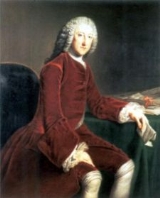
Whig
statesman who led Britain during the Seven Years' War
(known as the French and Indian War
in the United States). He again led the country (holding the official title of Lord Privy Seal
) between 1766-68.
Pitt is best known as the wartime political leader of Britain in the Seven Years War, especially for his single-minded devotion to victory over France.
It must cut up Liberty by the root and poison the Fountain of Publick Security; and who that has an English heart can ever be weary of asserting Liberty?![]()
My Lord, I am sure I can save this country, and no one else can.![]()
While we had France for an enemy, Germany was the scene to employ and baffle her arms.![]()
The poorest man may in his cottage bid defiance to all the forces of the Crown. It may be frail — its roof may shake — the wind may blow through it — the storm may enter — the rain may enter — but the King of England cannot enter — all his force dares not cross the threshold of the ruined tenement!![]()
There are many things a parliament cannot do. It cannot make itself executive, nor dispose of offices which belong to the crown. It cannot take any man's property, even that of the meanest cottager, as in the case of enclosures, without his being heard.![]()

